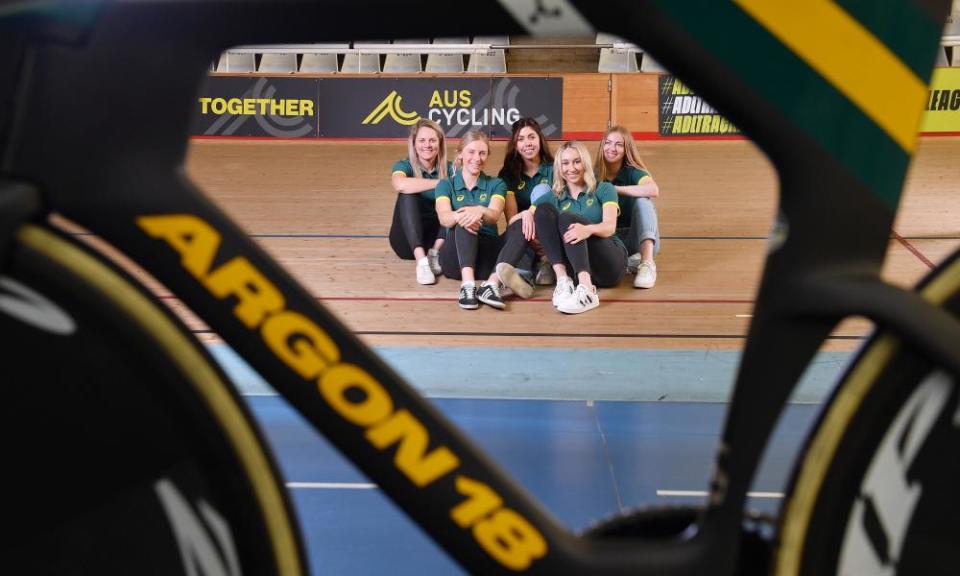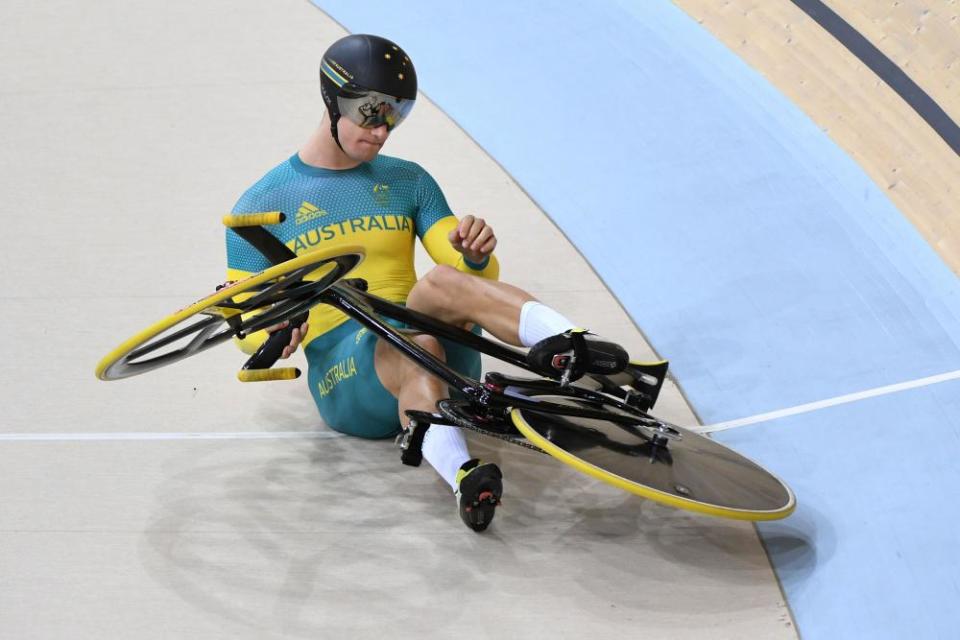Australia’s track cyclists ‘quicker than ever’ but Olympic expectations remain unclear

It was a combative tweet. Four days after Australia had left the 2020 UCI Track World Championships in Berlin with just three medals (and not a single gold), Simon Jones – AusCycling’s performance director – sent a message to the world. “To all those key board experts out there – fuck you,” he wrote. “We got a great team of riders, coaches, support and sponsors. Bring on Tokyo team.”
The tweet, and Jones’ Twitter account, were soon deleted. But the incident underscored the fraught politics in the shadows of elite cycling. If Jones’s riders succeed at the 2021 Olympics, the Englishman will be vindicated. If Australia fails to perform on the track and road, he might be out of a job. The legacy of his four-year rebuilding project hangs in the balance, to be determined by millisecond margins in the Olympic velodrome.
Related: Richie Porte wins Criterium du Dauphine with Geraint Thomas third
“It was a minor indiscretion,” says Jones of his tweet, six weeks out from the Games. “But sport is about passion. At the end of the day, I love what I do. I think it’s good to show a bit of passion.”
Jones, 51, has been at the head of AusCycling’s high performance program since early 2017 (at the time it was Cycling Australia, responsible for track and road, which subsequently merged with Mountain Bike Australia and BMX Australia). The Bristolian was hired from World Tour outfit Team Sky, and he had previously spent time with British Cycling.
The appointment was, in effect, an admission of defeat. Australia’s cyclists had long been major contributors to Olympic medal success. The nation’s riders travelled to the 2016 Olympics with high expectations, hoping to reverse a dip in performance at the prior Games in London. Yet they returned from Rio deflated, with just two medals (neither gold). Australia’s arch rivals, Britain, topped the cycling medal tally with six golds and 12 medals in total. Having failed to match the British, Australia tried to copy them – poaching Jones, who had been trained at British Cycling’s school of “marginal gains”.
A turnaround plan was swiftly implemented. Riders, coaches and support staff were shown the door; Jones earned the nickname “Hurricane”. But his methods appeared to be working. Australia has consistently won medals at the road world championships in recent years, while the track team dominated at the 2018 Commonwealth Games and finished joint top of the medal tally at the 2019 track world championships. “Change is hard, change is confrontational,” track sprinter Kaarle McCulloch told AFR Magazine last year. “But the definition of insanity is repeating the same thing over and over and expecting different results. Simon was the change we needed.”
Yet disappointment in Berlin, on the eve of the Olympics (before the Games were postponed), crystallised broader concerns about Jones’s tenure. Michael Drapac, a financial benefactor of the sport in Australia, told Ride Media that “the appointment of Simon Jones in 2017 will arguably prove to be the greatest mistake Cycling Australia has ever made”. A number of athletes have publicly criticised the administration. Track rider Caitlin Ward, in a post on Instagram last year, was defiant: “Cycling Australia and their antics pushed me mentally to the edge. And I came back. I get to say when it is over.”
Jones admits that Berlin was a shock. “It showed the standard had gone up,” he says. At the time, and now more than a year later, he defends the results as a matter of priorities. “We were focused on peaking in Tokyo,” he says. This is true – Guardian Australia was embedded with the team at the time, and riders were training through the competition rather than tapering. Jones’s alma mater British Cycling has been known to underperform at the world championships before an Olympics, and then excel at the Games. Even still, the disappointment provided fuel for critics. “Berlin was a great opportunity to see that the standard had gone up and we needed to lift,” he adds. But come Tokyo, will Jones and his riders sink or swim?

“It’s been a blur,” Jones says of the past year. The performance director and his team returned from Berlin in early March 2020 as Covid-19 was circulating; one staff member tested positive on return. The team initially thought they were entering the final stretch before the Tokyo Games, but within weeks the Olympics had been postponed. “The hardest bit was right at the start – the initial spectre of the pandemic,” he says. “All the conjecture, information and misinformation.”
Related: ‘It’s the journey, not the destination’: cycling writer rolls out on 4,900km odyssey | Kieran Pender
Jones is speaking from Perth, just days before he travels to Brisbane – where Australia’s track cyclists are gathering at the Anna Meares Velodrome for final preparations ahead of Tokyo. Most of Australia’s road riders are midway through the European calendar for their trade teams, while Australia’s freestyle BMX riders are returning home from the world championships in France – where Queensland’s Logan Martin won the title and confirmed his status as a gold medal favourite.
Despite the Olympics being barely a month away, uncertainty surrounds the Games. “We’re still not sure whether we have approval to use our own accommodation,” says Jones (AusCycling has booked a hotel close to the Izu Velodrome, which is two hours from the athlete’s village Tokyo). “That’s a major challenge – you need somewhere to sleep.” Last-minute logistical headaches caused by Covid have upended the finely-tuned approach favoured by high-performance sporting organisations. “Normally our focus would be on maximising and optimising performance,” Jones says. “Now we’re spending a lot of time just on turning up.”
But Jones remains upbeat. In the weeks ahead, his riders and staff will focus on getting the little things right. “Under pressure, most people will revert to their training mindset,” he says. “You’re only as good as your training and preparation. We just keep working on preparing, rehearsing, practising.” The final stretch will include a focus on acclimatising to a pandemic environment – something that Australian athletes, kept safe in the bubble of the nation’s borders, have not experienced. “Just little practical things like wearing a mask all the time – that’s not something we’re used to,” he says. “We’re going to be practising those little details. You can’t completely simulate it, but you’re just raising people’s awareness to the change.”
On the road, Australia has multiple medal prospects: two-time world champion Rohan Dennis is a favourite in the time trial, despite the recent emergence of Italian challenger Filippo Ganna. Amanda Spratt, a two-time world championships medallist, is well-suited to the punishing Mount Fuji road race course, while Richie Porte is on-form having won the Critérium du Dauphiné last week. BMXer Martin will fly the Australian flag in the freestyle, while mountain biker Rebecca McConnell has podium potential.
But on the track, after the disappointment of Berlin and following a racing-free calendar over the past 15 months, it is unclear where Australia stands. “I don’t know how we’ll go from a medal perspective,” says Jones. “We can’t control that bit – but all I know is that we’re going quicker than ever. Significantly quicker than ever. We have to do that and a bit more when it matters. This might sound cheesy, but it’s real: all you can do is what you can do. If we can exceed what we do in training, we’ll be right in the medals.”
Australia’s track athletes have not left Australia since the pandemic. While there have been no major international competitions in the past year, Australia’s primary rivals in Europe and North America have continued to race, Covid-19 notwithstanding. “By and large they’ve carried on – they have been travelling and racing quite freely,” says Jones.
Related: The long and winding road of an Australian cycling race older than Tour de France | Kieran Pender
This means that, in “racing” events such as the omnium, madison and keirin, it is almost impossible to predict how Australia might fare. “We are definitely in the dark,” says Jones. “We’ll go into those events as underdogs, but I’m happy to be an underdog.” In “timed” events – such as the team pursuit, long a discipline where Australia has excelled, and the team sprint – Jones is quietly confident. “We know where we are at,” he says. “We have medal chances in quite a lot of events – it’s just whether we can convert them.”
Australia’s prospects have been dented by two retirements following the 2020 postponement – experienced endurance squad member Amy Cure and world champion sprinter Steph Morton both decided against another year. “Our medal chances are probably a bit lower than a year ago,” Jones says. “In women’s team sprint, we’re probably not going to be a medal chance, whereas before we were hunting for gold. That’s unfortunate, but there’s no point pretending it is other than what it is.” The retirements do, though, provide opportunities for younger riders. “When one door closes, another door opens,” he says.

When Jones was hired, some speculated that the move was a stepping stone for the Englishman – with a leadership position at British Cycling the ultimate goal. Jones’s contract with AusCycling ends later this year; he says he is “just focusing on Tokyo at the moment”. Although he adds, reflexively, that “my job is to put plans in place for the future – so we’ve done a lot of planning around Paris [the 2024 Olympics], we have our Commonwealth Games planning [in Birmingham next year] in place”.
Related: Virtual reality: how cyclists are pedalling through the pandemic
Jones says that, whatever happens in Tokyo and whether or not he is offered a contract extension, he and his family are happy in Australia. “We’re going to stay,” he says. “Maybe not forever but certainly for the next 10 years. We’re just selling our house back in the United Kingdom, actually. We miss our family a lot, but thankfully technology helps.”
Asked about that infamous tweet, the critics and whether medals in Tokyo would vindicate his reign, Jones demurs. “We’re just sports people, doing our best, challenging ourselves,” he says. “I don’t think there’s any vindication. I think we’ve had some good performances over the past three or four years. Some you win, some you lose. There’ll always be another bike race.”
That may be so. But Jones knows that athletes, and administrators, are ultimately judged on results. “It’ll be interesting to see, on the other side of it, how we stack up,” he says. “But the medal tally will be the medal tally. There will be no excuses.”

 Yahoo Sport
Yahoo Sport 





































